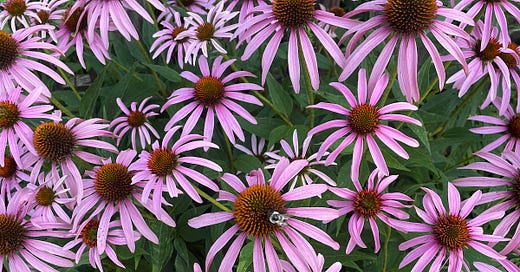I think a lot about energy these days—about noticing what charges or depletes my metaphorical battery.
So much is vying for our attention; so many activities and considerations go into participating in modern adulthood.
Sometimes I have to remind myself that I have choices.
That I don’t have to track every aspect of the upcoming election, for instance. That I can read Ross Gay’s essays on delight and joy instead (absolutely political material). That I can allow myself to be mentored by others that center expansive, soft ways of being in the world—not as a way of denying that other ways of being exist, but as a way of staying connected to what matters most; of feeding my heart; of staying grounded and present so I can show up to the unpredictability (and wonder, and beauty, and…) that life holds for me as a fellow citizen, friend, parent, and therapist.
It’s not radical news: over-functioning (ignoring our true capacity—both energy and time), constantly tapping into the noise of the world, and neglecting to prioritize what feeds us leads to burnout.
And burnout leads to being less present when we’re with our loved ones; it leads to cynicism, hopelessness, and numbness; it makes it more difficult to enjoy our lives.
What feeds you?
Folks who read my former newsletter for creative business owners, The Makings, know that I’m a big fan of experiments and an experimental mindset. I appreciate the reminder that scientists, from what I know (*cough* not a scientist), do not categorize data as ‘good’ or ‘bad’—it’s all data, and data helps us learn and see connections.
I suspect that many of us have a hard time knowing exactly what nourishes us or expands our hearts. Maybe you once knew, but you’re in a new era (thank you, Taylor) with different needs. Perhaps what lights you up has shifted post-Covid or as your kids have grown or as you’ve aged. Maybe it’s time to experiment?
Or, maybe you find that it’s really hard to prioritize your heart over other aspects of life.
I’ve shared before that staying soft is tricky business. Our nervous systems are wired for safety and connection: prioritizing what feeds you over caring for others or making money (for instance) might feel wildly uncomfortable.
Can you bring some curiosity to noticing what gets in the way when you take steps towards caring for yourself? This is great territory to explore with the support of a therapist.
This brings me to one source of nourishment I’ve appreciated lately: essays and poetry by Andrea Gibson.
Andrea writes the Substack newsletter Things That Don’t Suck, and this, along with their Instagram poems and videos (@andreagibson), are heart-centered nuggets of wisdom about being human.
They wrote an essay back in May that’s been sitting in my inbox for me to share with you, called Lessons From My First Surf Lesson. Here’s a bit of it, but you can read the full essay yourself:
From early childhood we are taught that the definition of a good life is one in which the waters are routinely calm, where our boat is rarely rocked. Culture instructs us to think that the sea of life should be tranquil, and any ripple means something has gone wrong. But the sea was never meant to be calm. Waves are part of the design. A static ocean would not sustain life, nor would a challengeless existence. I know this for sure—the parts of my life that have threatened to sink me were the parts that awoke me to my capacity to sail.
Here’s what I spent decades not understanding—smooth sailing does not require a smooth sea. Not only is it possible to not be pummeled by the waves—it’s possible to ride them to places we would not have arrived otherwise.
If a person is caught in a literal riptide, their instinct will be to fight against the current. But any lifeguard or survival guide will instruct the opposite. If the waters are rough, relax your body and float. Resisting the waves will tire you out, making you all the more likely to drown. This is true for the waters of life as well.
Does this mean not feeling? Absolutely not. I once thought I would have to suppress my emotions to relate to circumstances such as a cancer diagnosis without going mad, but I’ve learned the opposite is true. It isn’t about denying my feelings, but ceasing to resist them instead. My therapist Julie long ago taught me to soothe my hard emotions by inviting them to get even bigger. I thought she was bonkers until I tried it and found that welcoming fear, grief, anger, etc. made them move through me so much faster.
-Andrea Gibson
I invite you to share what’s expanding your heart in the comments.
Take tender care,
Laura






Thank you, Laura, for this post. The principles and mindset you describe are so counter to the noise in the world, that I need to be reminded of them regularly. I also appreciate the excerpt you shared from Andrea. All so true for me right now as I recently received a cancer diagnosis myself and am learning to "ride the waves to places I would not have arrived otherwise." So this challenge and these nourishing words from friends like you is what is expanding my heart at this moment.
Thank you, Laura, for this post. The principles and mindset you describe are so counter to the noise in the world, that I need to be reminded of them regularly. I also appreciate the excerpt you shared from Andrea. All so true for me right now as I recently received a cancer diagnosis myself and am learning to "ride the waves to places I would not have arrived otherwise." So this challenge and these nourishing words from friends like you is what is expanding my heart at this moment.